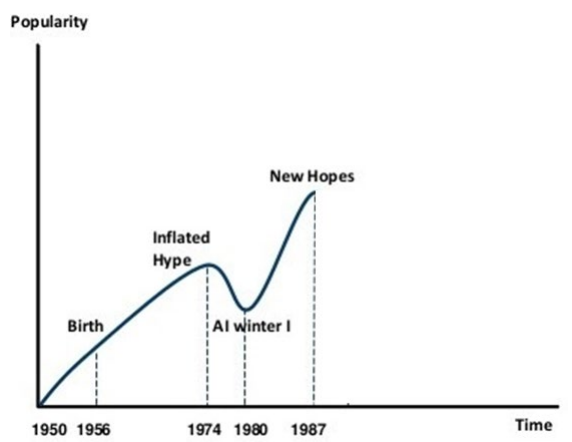History of AI
How old is thinking machine idea?
can be dated back to ancient times, when Greek myths and legends portrayed mechanical beings endowed with intelligence.
Who/when do we credit with exploring mathematics of how brain operates?
René Descartes
1st AI philosopher
Ada Lovelace
When was AI term adopted by academics for area?
1956: Dartmouth Conference
GPS
General Problem Solver: describe (model) problem in logic and it will solve it using logical inferences
→ You cannot make essentially represent anything in the world via a logic? The problem is just too big, and the real world problems are too fuzzy.
What type of AI existed before AI-Winter I/what about that type of AI didn’t succeed as expected?
GPS
AI Winter I
No one want to fund AI projects anymore
( )
)
What type of AI succeed after AI Winter I before AI Winter II?
Knowledge-based approaches:
• 1969—79: Early development of knowledge-based systems
• 1980—88: Expert systems (path finding) industry booms
→ Only solved too specific problems
What types of AI have succeeded post AI Winter II?
Statistical approaches, machine learning, AI Spring, Deep learning, neutral network
What are some pivotal events post AI Winter II in AI?
- 1997 Deep Blue beets Gary Kasparov
- 2006: UoT develops Deep Learning
- 2011: IBM's Watson won Jeopardy
- 2016: Go software based on Deep Learning beats world's champions
Connectionist
- inspired by the Human Brain
- systems of interconnected units (or "neurons") that work together to process information.
Deep Learning
- networks consist of multiple layers of nodes (hence "deep" learning) that process information in a hierarchical manner.
- type of connectionist
Compare connectionist AI to symbolic AI.
- Connectionist
- Based on neural networks, inspired by the human brain.
- Learns from data through training focusing on pattern recognition, classification, and prediction.
- Symbolic
- Based on logic and explicit symbol manipulation
- Rule-based systems that follow predefined logical rules
What are some future/currently developing AI areas from class slides?
- Future: Deep learning, machine learning, digital assistants, service architectures, internet of things, self-automation